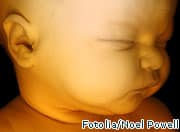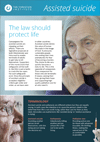The first transplant involving a controversial ‘saviour sibling’ has been successfully carried out in the UK, but critics warn of the complex moral issues involved.
Megan Matthews, aged nine, received tissue donated by her 18-month old brother Max who was created specifically to help treat Megan’s illness.
However there is great concern about the psychological impact on a saviour sibling.
Guilt
Critics caution that a child could grow up thinking they are loved only because of their ‘spare-parts’.
Or if they fail to save their sibling they could end up carrying a burden of guilt and failure.
Critics also say the practice opens the door to ‘designer’ babies, where children are created to parental specification.
And creating children for ‘spare parts’ values people for their mechanical usefulness rather than their intrinsic human dignity.
First
Saviour siblings are children created using IVF with the primary aim of providing spare-part tissue for an older brother or sister.
Megan’s procedure is the first time doctors in the UK have undertaken an entire treatment from the IVF process onwards.
The nine-year-old from King’s Lynn, Norfolk, was born with the rare blood disorder, Fanconi Anaemia, which can cause bone marrow failure.
Her condition meant she needed transfusions every few weeks and was unable to fight infections.
Megan’s parents Katie and Andy Matthews went ahead with IVF treatment, paid for by the NHS, after a worldwide search for a donor was unsuccessful.
Risk
In February a BBC documentary on ‘saviour siblings’ was criticised for ignoring the complex moral issues involved.
The practice of creating saviour siblings was made legal by the Human Fertilisation and Embryology (HFE) Act 2008, which passed amidst much ethical controversy.
When the HFE Bill was going through Parliament concerns were raised that children who were born to help their siblings would be seen as ‘spare-part’ siblings.
Unacceptable
Speaking in the Commons as the HFE Bill was progressing, David Burrowes MP said: “To help me to understand the impact of saviour siblings, I think about the situation in my own household.
“Yesterday evening, I was holding my one-year-old, Toby, and thinking to myself, ‘What problems would be created if Toby were to be a saviour sibling for his older brother, Noah, if, for the sake of argument, he had a serious genetic defect?'”
Mr Burrowes went on to say that if the older son became ill later in life and the younger son’s tissue could be used to ‘repair’ him that might leave Toby as simply a “spare parts sibling”. He concluded: “That is unacceptable.”
Manufacture
During a debate on the HFE Bill in the House of Lords, Christian Peer Lady O’Cathain also spoke out against the creation of saviour siblings.
She said: “To manufacture a person in this way is to offend against the respect that is due to the integrity of that person, no matter how compelling the goal of trying to cure.”
Lord Tebbit said at the time: “Because it might bring great benefits to particular people does not mean it should be done.
“If we accept arguments of that kind we are effectively saying that the end justifies the means.”


